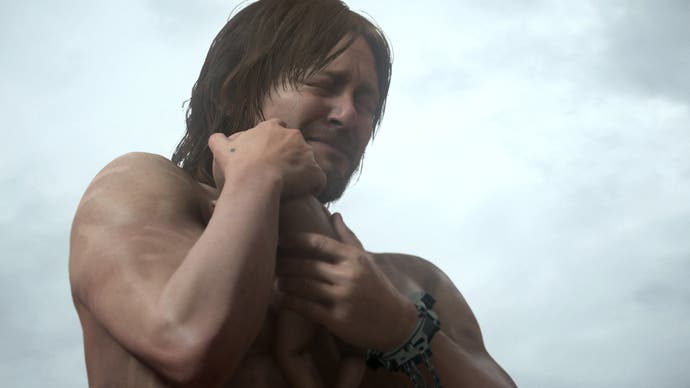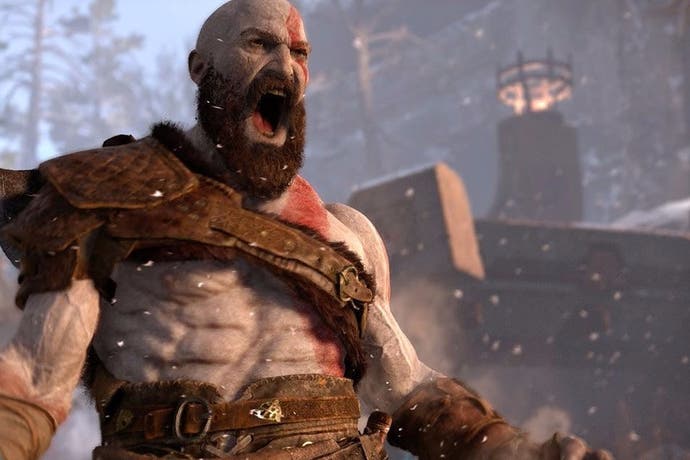Fatherhood isn't the shortcut to emotional complexity games wish it was
Dad space.
This year's E3 was a river of dads, and I am unhappy about it. (I did wonder briefly about the appropriate collective noun for dads: a Wickes, a Touchline, or, for us kids of divorce, an Absence? Just kidding, Dad - and I hope Spain is treating you well).
Clearly there are no unresolved emotional issues at play here - so what's my problem? As an actual dad myself with real children I am not against dads, as a group. They are Fine, if solitude isn't an option. But given their baggage and patriarchal demagoguery, do they belong as a pronounced theme in games as diverse as God Of War, Dishonored 2 and Death Stranding? This is what I am skeptical about, and why I think we should ask these dads the same questions we should regularly ask all dads: What are you doing? Why are you here? And why do you all look so tired?
Regis Lucis Caelum 113 has a very good answer to this last question. The father of Final Fantasy 15's playable hero Noctis, and the anxious star of its associated animated feature, Kingslaive, dear Lucis has got the usual set of worries - he's protector of a magical kingdom, his son is supposed to be saving the world but is actually on a road trip that looks like a remake of The Hangover featuring catalogue models, and he's ageing at an accelerated rate because he's using his life energy to maintain a force field generated by a supernatural crystal (that's why he's tired, kids. That's why daddy is tired). He's waylaid by responsibility, faced with impossible problems, and, on the big screen, he's played by that poignantly crumpled embodiment of doomed care, Sean Bean. He is, as far as this list goes, a pretty regular, blue jeans and TalkSport kinda dad.
Also reasonably regular, for a man who can summon rats and occasionally consults a heart that he keeps in his pocket, is Dishonored 2's Corvo Attano. What I like about Corvo is that, even before Arkane Studios officially let on about him being Emily Kaldwin's dad at last year's E3, being a father was at his core. He has always been Emily's protector, teacher, and anxious hanger-on. His and our purpose in Dishonored has always been a universal dad-trope - to get Emily, our child, where she needs to be, while sometimes feeling guilty about the things we need to do in order to achieve this. There's also the bonus of Dishonored's chaos barometer, which has the world and Emily reacting to the brutality of your playthrough to hammer home the disappointment that, much as in real life, your children learn more from watching what you do than by listening to what you say.
I wince a little that both of our examples so far are about fatherhood and war, fatherhood and violence - but they are at least set in worlds which are richly drawn and thematically diverse. That's less true of Gears Of War 4 which, after a pre-E3 tease, gave us full-dad Marcus Fenix at the end of a gruelling burst of new gameplay. Gears Of War is of course ideal dad territory, perfect for a mode of storytelling all about the lineage and influence of men. Gears Of War, in which there are castles but it is also the future. Gears Of War, where mankind has adapted to a state of constant war by evolving into trapezoidal roid-lummocks, forms free from any suggestion of the lithe or feminine: heads as round and strong as footballs sitting neatly on shaved gorilla torsos which are covered, Buckaroo-style, in as many guns as possible. What does it mean to be a father in this world? It means carrying a tree in a flashback and hoping that one day your boy will grow up to be exactly like you.
The newly revealed God Of War has similar problems. As revealed in a roaringly approved on-stage demo, Kratos has apparently transitioned into Norse mythology and become a father, moving through a frozen Scandinavian landscape with his young son and a new, brilliant beard.
This is fatherhood as growth, fatherhood as shortcut to emotional depth. And Kratos needs this depth - he is a relic from another era, when things like murder and 'hammer X to pleasure ladies' seemed fine, somehow. But, on the evidence we've seen so far, his new fatherhood seems like an attempt to inflate a one-dimensional world with the wheeze of strutting machismo. We see Kratos suppress his rage meter when his son fires an arrow prematurely, the game eager to point out that fury is no longer his only mode of communication. But what what we have instead is the empty rhetoric of every touchline warrior who's tried to simply insist their children into accomplished adulthood. "Do not be sorry - be better."

More troubling, or predictable, or both, is that fact that the premise of this humanity-expanding, father-son bonding exercise is to teach a boy how to kill things. Kratos and son crouch together over the straining string of a bow, Kratos and son hold the hilt of a knife as it glides into a prostrate elk. You might think, on reflection, that Kratos would see the virtue of not killing. That, with his skin infused with the physical remains of the family he murdered in a frenzied bloodlust (a trying first marriage), he might have given the whole thing a second thought, after many centuries, after countless agonies.
For perspective, the things I have taught or tried to teach my son include: how to share, how to kick with both feet, how to lose, how to say sorry, how not to be shy, how to be better than I was. I've also got a daughter - her list is similar, though tailored to her in specific ways that include bubble writing and the movies of Tina Fey. These are the things that constitute real parenting of actual children. Kratos doesn't have a daughter, just a dead wife (maybe two) and a lifetime, a soul's worth, a literal skinful of regret. Imagine him teaching a daughter, how it might challenge him. Imagine him bonding over something other than a corpse. Imagine games that showed emotional depth through something other than learned values of violence.
Perhaps that game was at E3 after all. Let me tell you about the one thing I played last week that best conveyed the mix of soaring awe and crushing responsibility that fatherhood has consistently revealed itself to be - The Last Guardian.
The screenwriter Drew Goddard once said that sometimes when a scene isn't working he'll swap which character is saying which lines, and the unexpected exchange of sympathies and self-awareness provides a spark of magic. This is how The Last Guardian feels - a realistically robust and bustling boy given charge of a titanic but naive creature, with something in the surreal transfer of physical size and burdened understanding capturing with heartbreaking accuracy the powerful and fragile bond of parenthood.
Fatherhood isn't an accessory, or an upgradeable character trait, or a snap-on mark of maturity or earnestness, as so many of this year's other games would have it be. It's an overwhelming source of agony and purpose that - yes, I am saying - is a bit like owning a vast and feathered cat.

